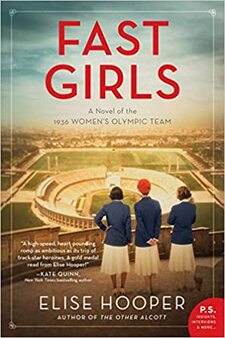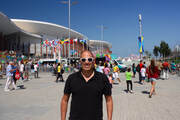Elise Hooper's 'Fast Girls' Entertains and Enlights
A Quick Book Review
Boy, am I embarrassed. It's taken me way too long to get to, and finish, 2020's Fast Girls by Elise Hooper. Between day-to-day distractions, my day job, not dedicating enough reading time...etc....I just hadn't gotten through it. Until now, thankfully.

Subtitled A Novel of the 1936 Women's Olympic Team, Fast Girls is much more. Centered on the experience of track stars Betty Robinson, Helen Stephens, and Louise Stokes, the novel starts us eight years earlier in 1928 when Robinson first experiences the Olympics in Amsterdam, one of the advance guard of female athletes defying 'hysterical feminism' to compete.
From there, we are introduced to Stephens and Stokes, as all three follow wildly different paths and experiences en route to the Olympics. Whether through battling misogyny, pervasive racism, injury, or the financial effects of the depression, their individual journeys are presented in such compelling and vivid details, Hooper's work is a fascinating look into the hard work and perseverance these embattled athletes undertook to fulfill dreams.
Along the way, additional characters, particularly Stokes' companion in racially-inflicted trauma and disappointment, Tidye Pickett, add depth and emphasis to the experiences. Likewise, we're presented with eye-opening characterizations of legends Stella Walsh and Babe Didrikson, as well as the colorful swimmer Eleanor Holm.
Presented as a historical novel, Fast Girls offers a sense of realism that is easy to embrace. How much liberty Hooper has taken is hard to measure for the lay reader, which would be common amongst such works. In the afterword, Hooper acknowledges a late key supporting character is an amalgamation of multiple real-life Olympians, and that a dearth of information on Stokes led to some creative license in the painting of her experience.
Another quibble is what seems an abrupt end to the novel. Billed as a story leading to success at Berlin 1936, the actual accounts of action from those Games only fills the last pages. One is left wanting a follow-through on how the Olympics shaped these women, and how their returns to various homes unfolded. A postscript is offered, granted, but this reader was so invested in each woman's story that more was desired.
That said, Fast Girls presents a captivating understanding of these athletes, and the times in which they competed. It's a definite recommended read for Olympic fans, and an important one for understanding the socio-political context under which these women found themselves.
Consider purchasing Fast Girls from Games and Rings' Bookshop collection, from where you'll find a selection of curated Olympic-inspired and related books.


 RSS Feed
RSS Feed